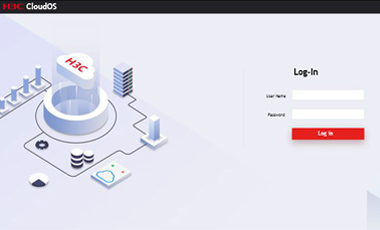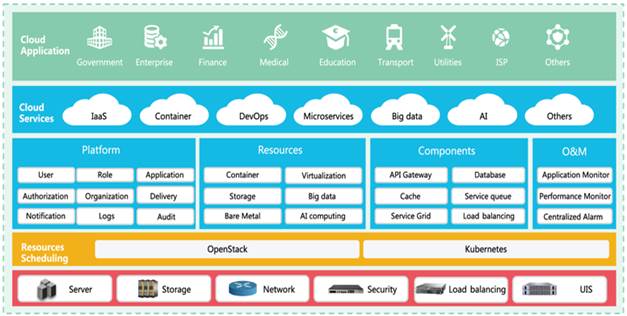Self-service portal
H3C CloudOS comes with a self-service portal that allows tenants to apply for, use, and manage cloud services. Through this portal, users can apply for IaaS resources and services including those related to applications, Big Data, AI, and development tests.
Rich cloud services directory
H3C CloudOS virtualizes IT resources. Users can apply IT resources based on their business needs. Cloud services that H3C CloudOS can now provide include:
IaaS services such as X86 virtual machines, cloud hard disks, cloud network disks, cloud firewall, cloud load balancing, cloud network, cloud database, public network IP, bare metal servers; PaaS services such as application warehouse, application management, Docker image repositories, application templates, and pipelines; development and test services such as project management, code management, and product management; NOSQL database , document services, in-memory database, offline computing, in-memory computing, stream computing, data integration, management of quality and metadata, workflow dispatching, and data warehousing.
Cloud network disk services
Cloud network disk services provide users with storage for unstructured data such as documents. Storing users’ individual data in a cloud and establishing the z data disk, allows unified data storage, ensures data security, enhances document and data monitoring. This services also support rights control for documents and provide classifications such as individual documents and shared documents, allowing units to share resources.
Application warehousing services
These services offer users with application storage, allowing upload, download, edit, view, and deploy applications from the application warehouse. The platform also offers private or public application warehouse, allowing on-demand use and enhancing application security. The application warehouse supports unified management of container applications and traditional applications, further raising the storage capability of the application warehouse.
Application management services
These services provide the management of applications that were rapidly built and deployed with application templates, warehouse, and blueprints. Users can view all services covered by an application such as basic information, container instances and update, edit, stop or delete that application. At the same time, such services can display topology and link information for the managed applications.
Docker image warehouse services
These services are based on a private cloud environment developed by the Harbor project. Users can push, pull, edit, view, and deploy Docker images in a warehouse according to their needs. The platform offers both private and public Docker image warehouses. These services address security concerns with the scanning function that detects vulnerabilities when any Docker image is being pushed.
Application template services
Based on self-defined YAML, application template services allow users to rapidly build and deploy their applications. After building templates, users can replicate or delete them according to their needs.
DevOps Pipeline services
DevOps Pipeline service provide simple and easy-to-use automated CI/CD functionalities. Through self-defined pipeline tasks, users can achieve automated deployment and upgrade. At the same time, they can manage data they built, view built history and delete any built history.
Multiple user roles
H3C Cloud divides users into three main categories: cloud administrators, tenant administrators, and end-users.
Cloud administrators - They are responsible for a data center’s operation and maintenance. Besides infrastructure maintenance, cloud administrators have to manage tenants, processes, and billing. In large cloud data centers, operations and maintenance are two separate roles taken up by different people.
Tenant administrators - They are responsible for maintaining cloud resources for tenants. They can manage cloud hosts, cloud firewalls, cloud hard disks, cloud load balancing, and cloud database within their own organizations.
End-users - They belong to a tenant and they are the users of cloud resources. Through self-service portal, they can apply for and use cloud services.
Optimal management of cloud operation
H3C CloudOS provides the management of cloud resources, enables cloud administrators to allocate resources, designs approval process, and manages users for each tenant.
Cloud administrators can monitor the health of cloud data center via a dashboard.
Cloud resources allocation for tenants
Cloud administrators allocate quota of resources such as CPU, memory, hard disk, networking for tenants according to their scales. They can adjust quota of these resources when the need arises.
Service process design
H3C CloudOS provides the optimal management of the approval process of cloud resources for industry users such as governments, enterprises, and educational institutes. Tenants need to submit their request for resource. And cloud resources will be pushed to users’ self-service portal after approval.
Monitoring tenants’ cloud resources
Cloud monitoring services are used to monitor tenants’ application resources deployed in a cloud data center. These services collect indicators from cloud resources to monitor the availabilities of different applications; and set alarms according to indicators. These services can monitor different resources such as cloud hosts (either Windows or Linux), databases (for example MySQL and MS SQL), middleware (For example Tomcat, weblogic, websphere and glassfish), and the availability of Internet applications through network protocols such as HTTP and ICMP. These services allow tenants to gain full understanding of their cloud resources utilization, performance, and operation. With alarm service, tenants can respond timely to ensure normal operation.Cloud administrators can customize approval processes for different tenants.
Collaboration with partners in the industry
H3C CloudOS offers rich REST API ports to allow third parties integration.
Collaborate with vendors such as AISHU to provide solution like unified backup.
Open-standard cloud interfaces
H3C CloudOS provides an open cloud business platform by offering rich REST API interfaces for third-party application deployment. The interfaces covers IaaS/PaaS/SaaS layers and provides compatible API for Openstack. The open cloud service platform can be achieved based on the open-standard interfaces.
H3C CloudOS provides more than 150 REST API interfaces for services including the management of tenants, hosts, hard disks, networking, firewall, load balancing, tickets, and operation logs. This allows our platform compatible with various application systems in many areas such as carriers, governments, utilities and finance.
AnyBackup: Cloud backup solution for H3C Cloud
AISHU offers its enterprise-grade data protection solution AnyBackup for H3C Cloud. It’s a highly-efficient, reliable, cost-effective data protection service, having been the No. 1 backup brand in Chinese market for three consecutive years. Equipped with protection power for virtual, physical and cloud environments, Anybackup allows easy setup and maintenance of disaster recovery centers and helps customers to face challenges such as the increasingly complex IT environment, exponential growth of data, growing TCO, and the lack of protection functions in products.
Product characteristics:
Single solution to protect virtualized, physical and cloud environment
Protect virtualized machines effectively to meet the requirement of new cloud data centers

 Products and Solutions
Products and Solutions
